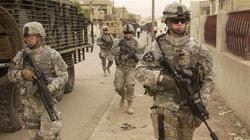 The Iranian government spokesman has vehemently dismissed the United States' unsubstantiated claim about the Islamic Republic's involvement in a rocket attack on an Iraqi military base housing US and Iraqi forces in the Arab country’s north, which the US used as an excuse to attack the bases of Iraq's Popular Mobilization Units last night.
The Iranian government spokesman has vehemently dismissed the United States' unsubstantiated claim about the Islamic Republic's involvement in a rocket attack on an Iraqi military base housing US and Iraqi forces in the Arab country’s north, which the US used as an excuse to attack the bases of Iraq's Popular Mobilization Units last night. RNA - "We strongly deny any role in attacks on the US forces. This unsubstantiated US claim cannot justify the bombing and killing of people in violation of international regulations," Ali Rabiei told Fars news agency on Monday.
He also condemned the "illegal and unjustifiable" attacks by the US on Popular Mobilization Forces' bases in Iraq, which led to the killing of nearly 30 people, leaving over 50 others injured.
"As part of its recurring lies and in order to justify this act of aggression and massacre, the US government claims the Iraqi popular groups are backed by Iran and has named them as the perpetrators of attacks on the US forces' bases in that country," he added.
Reuters cited American officials as saying on Friday that a “US civilian contractor” was killed in, what they described as, a rocket attack targeting the military base located near the Iraqi city of Kirkuk.
Several US service members and Iraqi personnel were also wounded in the reported incident, the agency added, citing a US-led military coalition, which has stationed itself in Iraq under the pretext of fighting the Takfiri terror group of Daesh.
On Sunday, Iraq’s Popular Mobilization Units (PMU), commonly known by the Arabic name Hashd al-Sha’abi, said US forces in the country had carried out an airstrike on a number of their facilities in the western Anbar province.
Shortly after the attack, the US Department of Defense, Pentagon, issued a statement, announcing that it had carried out what it called "defensive strikes" in Iraq and Syria against the PMU facilities.
The US invaded Iraq in 2003 under the pretext of combating “war on terror.” The invasion was followed by rampant violence blamed largely on widespread opposition inside the country to the foreign presence.
In 2014, the Arab nation was attacked by Daesh, which had reared its head amid the volatility.
Iran was the first country to rush to Iraq's assistance, famously preventing the fall of the capital Baghdad to Daesh. Iranian military advisers also helped train Iraqi volunteers for battle following Grand Ayatollah Ali al-Sistani's fatwa for Jihad.
Those volunteers now constitute the backbone of popular forces such as Hashd al-Sha'abi which have formally been integrated into Iraq's regular armed forces.
The US and Israeli regime regularly label popular resistance movements opposed to the US presence in Iraq as "Iran-led terrorist groups," a label which has been vehemently rejected by Iraqi officials.
847/940